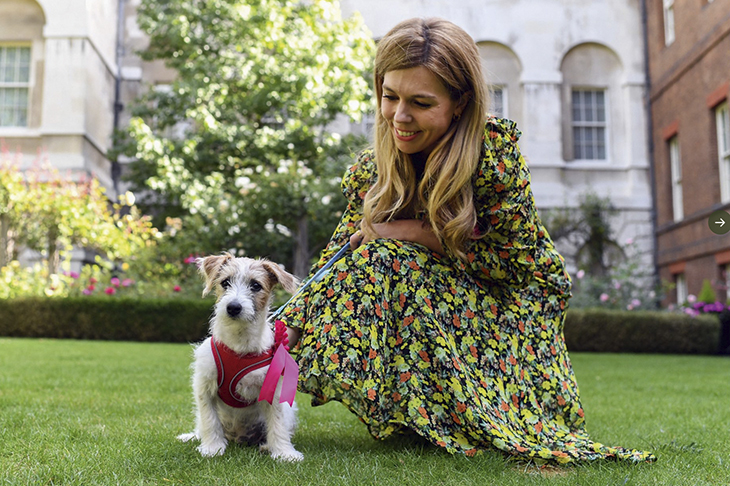President Harry Truman once observed: ‘If you want a friend in Washington, get a dog.’ Boris Johnson, as prime minister in the unfriendliest era British politics has known, and his girlfriend Carrie Symonds have taken on a Jack Russell puppy called Dilyn. They and I are therefore among the 24 percent of UK citizens who are dog-owners, with nearly nine million animals in our national ownership.
Taking on a puppy in retirement, said our friends, was madness — especially in a house full of antiques and with a carefully tended garden. Certainly, the game has changed since we last raised a puppy 40 years ago. So have the overheads. Vet’s bills and food we had factored in, but this time we were advised we had to invest in a puppy cage for sleeping (discarded after the second night) and another for car travel (discarded after the first journey in favor of a harness). Supermarkets now sell at least seven brands of dog training treats and pet shops sell bones from creatures in Jurassic Park.
Those who told us not to tie ourselves down with a dog gave sound advice, but the attractions cannot be calculated the same way. A fortune awaits the entrepreneur who can find a way of bottling the smell of warm puppies. Morning grumpiness is impossible when you have been greeted at the bottom of the stairs by a small happy body. When a gangly retriever seeking reassurance on its first car journey to puppy class curls itself into a small ball in your lap it is irresistible. The liquid eyes of a small dog in repose have a soulfulness to melt the hardest heart, even if their owner has five minutes earlier artfully stolen a full round of naan bread.
There are practical advantages too. ‘Varingo Dolly Mixture’ as the Kennel Club records have her, is a chocolate-brown (OK, ‘liver’ to the purists) flatcoat retriever known to us as Damson. Her twice-daily walks have already taken four pounds off my weight. People in our village who have never spoken to us in 10 years stop to ask about Damson’s progress. Our grandchildren are suddenly lining up to come and stay. We have scarcely watched television (cricket matches and the news excepted) since Damson arrived, and while we slump into bed at night exhausted by her energy, the consolation is the fun of puppy-rearing.
Not that she is perfect. If dogs’ lives are human lives multiplied (or divided) by seven then Damson seems to have transmuted straight from the terrible twos to teenage tearaway. At five months her legs have become long enough for her to reach the kitchen surfaces and sweep off anything edible with the dexterity of a croupier clearing the roulette table. It was only after some significant dents in antique table legs that we were given the best piece of training advice we have received: clove oil will stop a dog chewing almost anything.
We have subscribed fully to the ‘reward training’ advice of today’s kindlier dog whisperers. No taps on the nose or wallops for naughtiness. ‘Never engage in a chase’ they say. But what do you do when you hear the crunching of lenses as your puppy runs around with your reading glasses in its jaws? Reward training has its limitations too when your puppy decides to dig up prime patches of lawn turf. Boris, I guess, just threatens to fetch Dominic Cummings and little Dilyn scuttles back to his basket.
This article was originally published in The Spectator’s UK magazine. Subscribe to the US edition here.



















